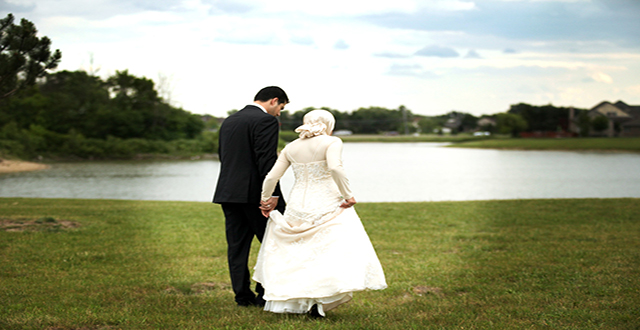
1-Be Pleasing To Each Other – After what pleases Allah, always seek to please your spouse, this is your key to Jennah.
Sisters: Prophet Muhammad (peace be upon him) taught us that any woman who dies in a state that her husband is pleased with her, she shall enter Paradise. So, try your best to please him (even when you think it is not worth it – it is still worth it)
Brothers: Did you read the way our prophet, peace be upon him, dealt with his family? Wake Up! You must follow his way in helping with cooking, cleaning and taking care of your own clothes (he did it, you can do it too)
2-Do not get Angry – Arguments a fire in your home – put out the fire as fast as possible. Our prophet, peace be upon him, said, “Do not become angry! Do not become angry! Do not become angry!”And he told us anger is from the devil (shayton) and the shayton runs through your body like your blood when you become angry.
Sisters: You already know men have a hard time admitting they are wrong. In fact, some men refuse to say it, and this is very dangerous for them, but also for you too. Be careful not to force the issues with him when he is upset. Treat him like the baby that he is imitating. Really, just take it easy and keep your cool. Allah will reward you and inshallah, Allah will guide your husband back on track.
Brothers: You know you are not perfect. Come on now, admit it and get it over with. Say, “I am sorry”. You can be the one to extinguish the fire of shayton in your home with a simple ‘I’m sorry’ even if you think it is not your fault.
When you fight back, you are only adding wood to the fire. Watch how sweetly an argument will end when you just say sincerely, “Look, I’m sorry. Let it go.”
3-Say, “Thank you” to your spouse constantly for the nice things done nicely.
Sisters: Prophet, peace be upon him, taught us; “Whoever does not thank the people, does not thank Allah“. So, just go ahead and say, “Thanks honey” and even add “Good job” or “Well done”. This is one of the most important techniques. Remember ungratefulness (opposite) is a characteristic of the people of hellfire. May Allah save all of us from that, ameen.
Brothers: When was the last time you said, “Thank you honey” to your wife for cleaning house, washing clothes, ironing, bathing the children, taking them to school, teaching them things? You say, “But she does that every day” — And that is the point! She is doing this day after day – But where is the pay? Give her something to make her feel worthwhile, say it!
4-Dress up for each other and look sharp. Islam encourages us to look and act our best in front of everyone, especially loved ones.
Sisters: Wear nice jewelry and dress-up at home for your husband. From the early years, young girls adorned themselves with earrings and bracelets and wore nice dresses – as described in the Qur’an. As a wife, you should continue to use the jewelry and the nice dresses for your husband.
Brothers: Do you think only sisters need to “dress-up”? What about our prophet, peace be upon him? He wore his nicest clothes, he even made sure to wash his own garments. And what about smells? You know how important fragrance is. Don’t ever let her smell your stinky sweat. She smells nice for you, so at least put on nice fragrance for her – you do it at the mosque, right?
5-Be like the people of Paradise – Act right, think right and look right (try this tip today)
Sisters: Do you know about the characteristics of the Hoor Al-Ayn(women of paradise)? Islam describes these women with certain characteristics. They wear silk, have beautiful, dark eyes, etc. Here are some ideas: Try it, wear silk for your husband, put eye make-up for your eyes to ‘enlarge’ them, and be sweet to your husband.
Brothers:
Where are your spouses going to get the fine silk dresses, provocative lingerie, sweet fragrance and makeup? Quran tells us (Surah 4, verse 34 – above) You are the one responsible to provide – so get with it and start providing.
6-Spread “Peace” amongst yourselves. This is in Islam for sure. The Quran talks about it, and our prophet, peace be upon him, said, “You will not enter Paradise until you believe and you will not believe, until you love each another. Shall I direct you to the way to love each other? Spread the “salams” (peace) between you.” – narrated by Abu Hurairah
Sisters: When your spouse comes home, give each other the most wonderful greeting of a Muslim – “Salam alaykum wa Rahmatullah wa Barakatahu” Peace, Blessings and Mercy of Allah be to you, (and remember to smile).
Brothers: You give the “salams” to everyone you see, even brothers you just met. In fact, you are careful to give anyone you just met good salams – right? But what about your wife? The mother of your children? The one who is making dua for you every day and night? Do you give the proper salams to her, when you should? Entering and leaving the house? When you enter or leave a room?
7-Smile – It costs nothing and buys everything! Who can resist a nice, big, happy smile? It even makes me smile to think about it.
Sisters: Our prophet, peace be upon him, taught us; The smile in the face of our fellow Muslim is an act of charity. So you can keep peace in your family, make a sweet feeling in your home, get rewarded by Allah and maybe even a nice smile back.
Think how your husband would feel if he came in and found your nice clean home, his wife looking nicely dressed and made up for him, a nice dinner prepared with care, children cleaned up and welcoming him home. It really does help, even if he doesn’t say so.
Brothers: When was the last time you smiled at your wife? Can you recall the last time you brought home some flowers, chocolates, a small gift (nothing wrong with a nice of jewelry brother)?










